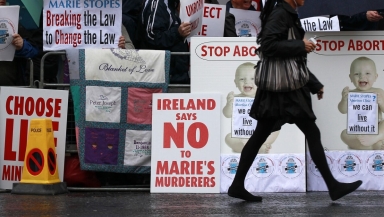The Catholic Church in Northern Ireland is calling for an appeal against a November legal ruling in Belfast's highest court that will allow abortions in cases of rape, incest and fatal foetal abnormality.

The Church claims there are grounds for a "fundamental challenge" and is seeking to persuade the attorney general to appeal against the landmark ruling.
The Presbyterian Church has said it also does not support the easing of the law, claiming it was "content" with the current law allowing abortion when the mother's life or her mental stability was at risk.
The secretary of the Catholic Council for Social Affairs, Tim Bartlett, has said the Catholic Church rejects the easing of the law for a number of reasons.
"The most obvious" one to reject, he said, was "the claim by the judge that there is no life to be protected in cases of so-called fatal foetal abnormality". He added that the Church preferred the term "life-limiting condition".
"In the Church, we work with women whose babies have life-limiting conditions, and these children can live for minutes, hours, days, weeks and in some cases years. The child is still technically, clinically and in every sense alive as a human person, and is entitled to have their life protected," he said.
He reiterated the Church's position that "the right to life of an innocent is always inviolable" and that "that right begins from the moment of conception, and science affirms that".
This right "is a fundamental moral principle on which society and human rights should stand", he added.
While admitting that rape was "the most heinous of crimes", he said the Church also rejected the right of a raped woman to an abortion, as "the answer is not to take the life of an innocent third party. The challenge is to give that person every possible support and care."
The Presbyterian Church agrees with the Catholic position on fatal foetal abnormality and cases of incest and rape, according to Norman Hamilton, a former moderator of the Presbyterian Church. However, unlike the Catholic position, the Presbyterian church holds that "where the mother's life is in serious danger, or if there is substantial risk to mental health, then the law allows abortion and we are content with that".
Admitting the declining political weight of the church in Northern Ireland, and claiming he had "no difficulty in the church being something of a minority voice in society", he said the abortion debate is larger than religion.
"This issue goes beyond faith. The right to life is a shared human value, not a uniquely religious value."













